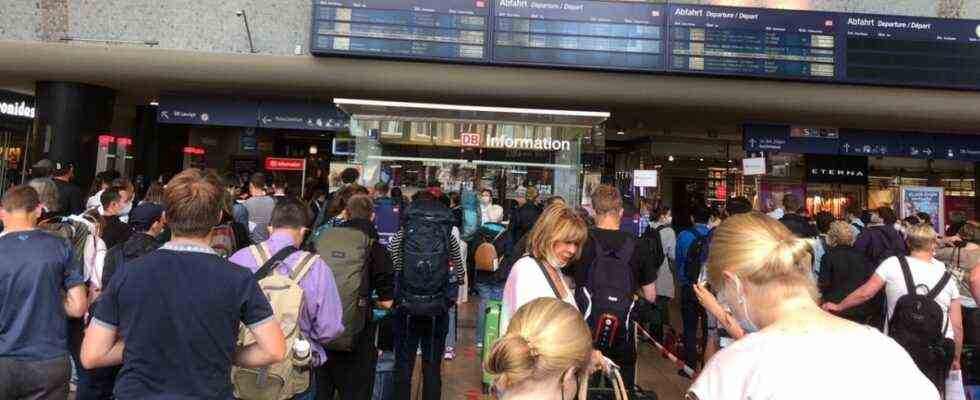The world melts in a gray liquid and with it all timetables. Rain pours on Cologne when screens, hotlines and websites let us down. It is the first evening of the flood disaster in North Rhine-Westphalia. Eight o’clock, the Messe / Deutz station has seen fewer trains in the last few hours than Unterheckenhofen on Christmas Day. People stand on the platform in fluffed raincoats and trolley cases wrapped in cling film, pushing the FFP2 mask up and down in frustration, looking from the mobile phone display to the information board and back again. The pigeons look worn out, torn from the rain, they sail along the empty track beds. None of us know how different everything is today, but that everything is different today is in the humid air.
Nobody knows yet what will happen tonight, nobody knows the places Ahrweiler or Bad Münstereifel, nobody has heard of insane numbers, more than 100 dead, thousands missing, collapsing town halls. There are still just a lot of annoyed train travelers.
There is little that upsets rail passengers as much as ignorance. The ICE to Munich, which was supposed to leave at 6.46 p.m., appears on the display board. Then the ICE will be written to at 7:36 p.m. Various features appear and disappear again. In addition, the number of minutes late is increasing. Suddenly Dortmund is on the blue sign. Dortmund? A groan goes around the platform, “Now Dortmund is there”, it echoes into the telephones. Then the ICE lights up again from 7.46 p.m. “Now it’s back to Munich,” the waiting people record their loved ones. But at some point even our loved ones don’t care what the ICE 615 does. We slowly lower our cell phones, and then it happens: We look at each other again as if we were discovering a forgotten relic: fellow human beings. Questioning eyes look at each other over the masks. Careful stalking, excuse me, where do you have to go? To Brussels. But I heard that nothing goes there today. I heard the train stopped in Düsseldorf. I heard that the main train station is completely closed. As prisoners of a higher power, we share our scant information. Everyone knows a little something. Together we puzzle together an assumption: Today there is no train at all. A backpacker who actually wanted to go to Berlin will spend the night with a couple he met in Vietnam. They live in a small house where you go to the bathroom with a shovel in the garden, he tells us. The young man, who wants to go to Brussels, calls a friend with the words: “Salve! You, I’m up to my neck.” And then he reveals to those who are less well connected in Cologne that there are hotel vouchers at the counter.
“I heard …” – “I heard …” And suddenly you see yourself as fellow human beings again “
Communication is unlikely, Niklas Luhmann knew. He knew about the obstacles in this social practice. The sociologist calls them the swell of discouragement. And wondered how society survives at all, although it is badly adapted to the environment, “although it repeatedly consumes environmental resources”, he once said in an interview and thus sounds creepy up-to-date. The pandemic society experienced in the past six months how unlikely communication is. Now a new crisis hits the rusty lockdown hermits who suddenly jump over their lonely shadows.
The heart of Deutsche Bahn rarely beats beyond the limits of passenger rights. The young woman next to me at the service counter breaks down in tears. The employee behind the window repeats the bad news: “I cannot issue a taxi voucher for your ticket. It works just“, and in the last three letters she carefully weighs the German rules:” only for long-distance tickets. “
“I’m here in a foreign country,” shouts the young woman and waves the damp, crumpled ticket to the darkening Deutz outside. A child rolls around on the station floor with a cuddly rabbit under his arm, the father stands next to him with large rucksacks, diving fins and snorkels stick out of the bag at his feet. The woman in front of the counter shakes her wet hair. She had received the ticket from the state, she had no money for a hotel, let alone a taxi. “Then you have to sleep at the train station for the night,” sums up the train employee. The father, who tries to protect his daughter from hepatitis B and to get her to get up, grumbles from behind: “Now don’t riot, girl.” And when the woman grabs her damp note and runs away crying, he assures me, as if the two had known each other for a lifetime: “I’ll check on her right away.”
“Your trunk is open,” I call the driver into the car. “I know,” he says and continues to talk to Serhat, as it says on the cell phone display attached to the dashboard. I get in, the driver changes from fluent Turkish to fluent Cologne. “So where are you going?” I look at the train’s hotel voucher and tell him the address. “What do you want in the hotel?” I explain what happened. Work, exhaustion, crisis. But Cologne’s cheerful nature at the wheel is impervious to emergencies of all kinds. “Well, that’s great. Have another night in Cologne!” – “Yes, yes. You see it all very positively,” I grumble from the back seat. “Well, listen, what do you want to do? You only live once!” No counter-thesis occurs to me in a hurry. “Well,” he begins and slows the car down. “I would go to a brewery now and eat some jute. I’ll drive you to the old town for the money.” The skyscrapers of Cologne-Deutz are blurring outside. I sigh. “To the old town, please.”

